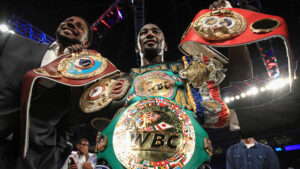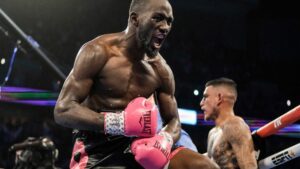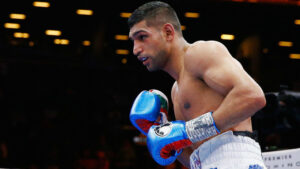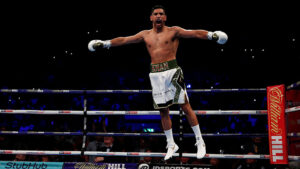Perched on the concrete steps infront of his home, Terence Crawford (34-0, 25KOs) looks every-inch the protagonist from an HBO drama. Pulling back his beautifully coated dogs or posing with his school of children at a Junior Wrestling Championship, he offers up the ‘family man’ alternative.
A complex character, Crawford, he was seemingly either draped in gold Versace or snapped out fishing, in slacks and a vest. A helluva fighter. His recent visit to London when announcing his bout with Amir Khan (33-4, 20KOs) resulted in a brief pit-stop.
“Tell Craig, some guy called Terence Crawford came to the gym. People were going nuts.”
A friend of my fiancée’s sent her a text, after a session in Miguel’s ABC in Brixton, exposing one of the Nebraskan’s short-comings – to many, he was just ‘some guy’. He’d waited for the departure of Floyd Mayweather Jr and the demise of enterprising, Nicaraguan Roman Gonzalez, primed to steal boxing’s top spot.
Then, those pesky Ukrainians had arrived.

The ever-relaxed stylist, known as ‘Bud’, has emerged from a tough, kitchen-sink type background, suffering as a result of his mother’s apparent alcoholism and an absent father. He once told Mark Kriegel that his father was ‘in, then out, in then out’ – something he’d later replicate in fighting form. Terence had been on probation and was ejected from a handful of schools for fighting. Everything he’s worked for now, was born from hardship.
Whichever way you look at it, though, he’s an excellent and accomplished champion. The Omaha native is a three-weight world title holder, completely undisputed at light-welterweight and now hunting the biggest names in a thriving division, at 147lbs. Ahead of his contest with Bolton’s Khan, slated for April 20th, I’d wondered if this might be his most impressive year, to date?
A young interviewer could be heard asking if this was Crawford’s first visit to the United Kingdom, blissfully unaware that he’d conquered on these shores once before. Sadly, as a proud Glaswegian, I remember it only too well. The American outclassed Ricky Burns almost five years ago, sparkling when presented to the British boxing public.

Detractors could argue that Crawford has lacked the superstar opponents that would cement his legacy until this point, with his biggest wins coming against Cuban puzzle Yuriorkis Gamboa and tough Ukrainian Viktor Postol. Approaching his physical peak at age thirty-one, it’s now time to hunt the elite fighters within his newest talent pool. A fight with Errol Spence Jr or Keith Thurman would light up any venue Stateside, but for now it was Khan firmly in his sights.
The face on the other side of the poster was familiar to boxing fans on this side of the Atlantic. Smiling and excited during Top Rank’s London press conference, it was a face we’d seen both shocked and jubilant, scraping himself from the canvas or lifting sparkling belts above his head. We’d watched him grow; from stunning the world in Athens; to grasping the turnbuckle, staring through glazed eyes at Breidis Prescott.
He’d been raised thousands of miles from Nebraska, establishing himself alongside his brother Haroon, as some of the most talented British amateurs. Bolton, the melting pot of culture, had kept Amir Khan grounded as he progressed towards national and international honours.
Since capturing the Olympic silver medal as a fresh-faced teenager in 2002, Amir has been thrust onto boxing’s front page. His success, his leg-wobbling defeats and his world titles have been enjoyed and scoffed at, in equal measure. Even the staunchest critics of the man who desperately cried out for a fight with Floyd Mayweather Jr, continue to tune in. He’s good value, whatever the outcome.

Now approaching the twilight of an unbelievable career, he’d turned his back on an enormous domestic bout with former world champion Kell Brook, in the hopes of once again finding greatness. Khan was older now, than he had been when facing Saul ‘Canelo’ Alvarez in one of the more obscure pairings in recent years. It was tough to gage whether any further wisdom had been instilled.
Growing up as a British-Pakistani and a practising Muslim had always meant portions of his own boxing public would struggle to support him. It’s a cold, sad fact, echoed when looking at criticism thrown at him from faceless social media accounts. Yet still, he continues to drag himself to the well for the benefit of those who retain the belief that his career still has meaning.
Now, Khan was fighting for himself and his family, with his legacy secured after exciting contests with Marcos Maidana, Danny Garcia and Devon Alexander. His ledger read names such as; Zab Judah, Marco Antonio Barrera, Paulie Malignaggi and Luis Collazo. Now, his next scheduled bout, in just over three months, may be one of his toughest.

If he turns up, razor sharp and punching quick enough to beat his own shadow, can he beat Terence Crawford? Could his defensive frailties once again betray him? The answer to both – as always with Amir – is yes. It’s what continues to interest promoters and the public, alike.
You’d make a case for ‘King’ Khan being one of Britain’s three biggest stars in boxing’s current landscape. Outside of Anthony Joshua, who else could claim prestige? His opponents, his achievements and that lingering sense of intrigue had kept him firmly in the driving seat when failing to negotiate a long-mooted fight with Sheffield’s Brook.
On April 20th, two of the sport’s biggest names will collide in what many journalists assume will be an easy victory for the champion. Terence Crawford will carry the weight of a betting favourite, never having faced someone with Khan’s speed. The unbeaten, younger man was blessed with outstanding ability, breaking down opponents, picking shots with shattering accuracy. From painful experiences himself, he seemed to enjoy hurting his opponents.
Expectation has followed Amir Khan, now aged thirty-two himself, since he was a teen. On this occasion, it had turned to hope, perhaps for one last time. Could he listen to Virgil Hunter, a man he’d been estranged from for his last two bouts? Khan presents his own battle, between heart and head.
It seemed probable that the outcome would depend on one variable – discipline.
Article by: Craig Scott
Follow Craig on Twitter at: @craigscott209